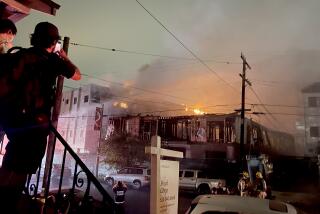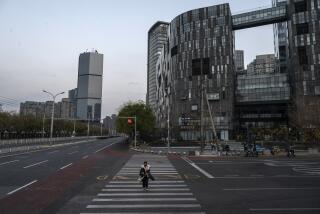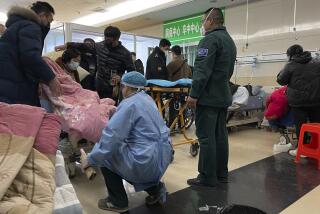With Growth, China Gets NIMBY Attitudes
BEIJING â When Beijing homeowners learned that the city planned to move its main infectious diseases hospital into their suburb, they did what ordinary Chinese are increasingly doing: They held meetings, organized a signature campaign and took their grievance to the government.
But these arenât ordinary Chinese. Theyâre lawyers, financiers, entrepreneurs -- a class of newly rich in a system that once believed itself to be classless.
Their protest is another measure of how much China is changing. Besides their concerns about public health, theyâre also worried about property values -- a turnabout for a society raised on the communist belief that private property is evil.
When they traipsed to the city governmentâs complaints office, the dozen or so suburbanites stood out from the largely working-class Chinese also there to press grievances. âWe were dressed very businesslike, so we were very obvious,â Margaret Zheng said of their first visit in late June.
The others waiting inside the reception area lined with plastic orange seats, she said, âwere common Beijing people.â
The not-in-my-backyard struggle is turning the usual order of social conflict on its head and exposing some of the shifting political realities in China. The rural and urban poor, who have struggled under an increasingly market-driven economy, often get shortchanged as their neighborhoods are razed to accommodate rapidly expanding cities and towns, legal experts and sociologists say. Meanwhile, the educated and the entrepreneurial have prospered in the booming economy.
But in the suburban area called Beigao, home to executives for multinationals such as Microsoft Corp., itâs the turn of the prosperous to fret. New houses in their gated, trimly landscaped communities fetch $400,000 and up, in a city where annual income averages about $3,500.
The facility to be moved there, Ditan Hospital, is where many patients were treated in the 2003 outbreak of the deadly disease known as SARS, or severe acute respiratory syndrome.
âThis will affect our physical health and our financial health,â said Andy See, a Chinese-born, Hong Kong-reared lawyer for telecommunications manufacturer Nortel Networks Ltd. in Beijing and a leading organizer of the opposition.
Itâs not clear whether Ditanâs move from its crowded city neighborhood to Beigao can be stopped. The Beijing Health Bureau says it carefully weighed the public safety issues and has full approval for the 600-bed, $55-million facility.
It says construction must begin within months if Ditan is to be up and running by the 2008 Olympic Games.
The hospitalâs well-to-do opponents have pursued channels unavailable to many Chinese: hiring a lawyer and using family friends and business contacts to deliver letters to Beijing Mayor Wang Qishan and to a vice premier with the health portfolio.
But they appear to be at a disadvantage against the larger backdrop of swelling unrest and sharpening class lines.
The nationâs police chief says there were 74,000 large protests last year. Some turned violent, with protesters venting their anger against government offices and, on at least three occasions in the last two years, against wealthier Chinese.
Sensitive to these trends, the communist government led by President Hu Jintao has tried to position itself as a champion of the underdog. It has clamped down on local governments transferring land for development and called for the displaced to be justly compensated for the sake of âa harmonious society.â
In such a political and social climate, Beigao homeowners worry that the government is not duly considering their interests.
âPoor people resort to violent means, protests, demonstrations,â See said. âFor rich people, we dare not do it.â
Like other residents, he knew nothing of the hospital relocation until the head of a film-distribution company living in a nearby compound angrily posted a leaflet at a neighborhood convenience store, after reading a small item in a local newspaper in June.
Soon, a group of about 20 residents held a meeting, organized the first of their two visits to the complaints office and began collecting signatures -- about 1,200 to date. Their lawyer drafted a petition asking for a review on the grounds that, contrary to regulations, the neighbors werenât consulted.
Last month, the government accepted the petition without comment, after initially rebuffing it on bureaucratic grounds.
Some residents sought out well-connected neighbors and friends. In response to one letter, the mayor toured the neighborhood in a 20-car convoy in early September, a witness said.
That letter, and another to Vice Premier Wu Yi, pointed out that the proposed site was too close to schools and the airport expressway, people familiar with the letters said.
Among the scenarios that residents have sketched are spread of airborne diseases, contagious patients riding public transport, and contaminated waste seeping into the groundwater or infecting mosquitoes, which could pass it on to humans.
The city Health Bureau and foreign medical experts said that the health risk is minimal provided the hospital has good ventilation and waste disposal.
âIf you build a hospital properly, if you run a hospital properly, then people should be happy to have a hospital in the area,â said Henk Bekedam, the head of the World Health Organization office in Beijing. His two daughters go to school near the proposed site and heâs not planning on moving them, he said.
The hospital at its current site has never had an incident of disease spreading in the neighborhood, the Health Bureau said.
Officials chose the Beigao site over others because it is on uninhabited state land with green space between it and residential areas, the bureau said in response to written questions.
âFollowing repeated arguments and overall consideration of expert assessments on the impact on transportation and the environment, we believe that Beigao is the relatively more suitable location,â the statement said.
Still, See and others canât help feeling they are being treated highhandedly because theyâre rich.
âWeâre not asking them to give up the hospital,â See said. âThereâs a need for it. Just not here. Not in my backyard.â
More to Read
Sign up for Essential California
The most important California stories and recommendations in your inbox every morning.
You may occasionally receive promotional content from the Los Angeles Times.










